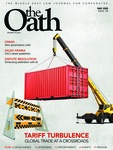Airline fined for breaking EU aviation law

Saudi Arabian Airlines has been fined around USD1.6 million by a regional Belgian government for breaching EU carbon emissions rules, making it the first big non-EU carrier to be fined for breaking the EU aviation law, according to Reuters.
The European Union requirement that all aircraft using its airports pay for carbon emissions caused international outcry when it was introduced at the start of 2012.
Faced with threats of a trade war, the EU changed its legislation to apply only to flights within the bloc, rather than the entire length of flights in and out of EU airports. That still included EU flights carried out by non-EU operators. While European airlines have largely complied, some non-EU airlines have not and environment campaigners say EU governments have been slow to collect fines.
Belgium, however, has exacted a fine on the Saudi airline which ranks as the biggest yet, officials said. The fine on Saudi Arabian Airlines applies to all its intra-EU flights since airline operators report to one authority only.
The German Emissions Trading Authority (DEHSt) earlier this year published a list of 44 non-compliant operators it fined for not surrendering carbon allowances in 2012, including Air Berlin and Air Arabia Egypt.
Britain's Environment Agency also fined five airlines for non-compliance in 2012, including Air India.
However the EU Commission said compliance was high, with operators accounting for 99 percent of aviation emissions complying with the rules.
KSA drafts law to allow women to vote for first time
Saudi Arabia has drawn up the legislation required to allow women to vote in council elections for the first time.
Saudi women will be able to vote and stand as candidates in the upcoming municipal elections from this December. The kingdom announced the groundbreaking constitutional reforms last year. Now, it has drawn up the legislation required to enact the changes, according to the Saudi Gazette.
Article 66 of the new law stipulates that any citizen with a valid ID can participate in the next municipal elections as a voter or candidate. Voters must be 18 or over on the day of the election on December 12, hold high school certificates and be registered to vote.
Under the law, local committees will prepare separate electoral centres for registered women to cast their vote. Women will also help organise the elections, appointing electoral committees and overseeing the process for female voters.
Men and women aged 25 or above and without any criminal record will be able to contest elections in the area in which they have been registered as voters. However, citizens who have been dismissed from public service for disciplinary reasons within three years of the election date cannot contest elections, the newspaper said.
Women could not vote or stand as candidates in the 2011 election but Saudi ruler King Abdullah ordered in 2014 that women should be allowed to take part in the elections from 2015.
The move is aimed at meeting the aspirations, dreams and needs of all citizens, particularly in local issues, the king said at the time, and is expected to double the number of citizens that partake in local elections in Saudi Arabia from 16,000 to at least 30,000.

























































































































